Protectors of Online Gambling Sites at the Communication and Digital Affairs Ministry
The number of people suspected of protecting online gambling sites increases to 18. Employees of the Communication and Digital Affairs Ministry are involved.
maaf email atau password anda salah

The number of people suspected of protecting online gambling sites increases to 18. Employees of the Communication and Digital Affairs Ministry are involved.

The Communication and Digital Affairs Ministry is tidying up house now that 10 of its employees are accused of participating in online gambling. Their flow of cash is being scrutinized.

The DPR and the Religious Affairs Minister disagree regarding an additional quota of haj pilgrims. The DPR deems Yaqut Cholil Qoumas has broken the law.

Ministry of Religious Affairs and Ministry of Agriculture’s right of reply on support for presidential candidates.

Former government employees at the Foreign Affairs Ministry are demanding the disbursement of unpaid wages. How did it come to happen?

ASEAN leaders finally came to a number of consensus, such as finding a peaceful solution through dialogue and sending a special envoy to Myanmar. Further steps are still needed. Tempo interviewed Indonesian Minister of Foreign Affairs, Retno marsudi.

Coordinating Ministry for Maritime Affairs and Investment conveys objection to the report of Dragons in Trouble in Tempo English of January 4 edition.

Ciputra’s love affair with the fine arts was undying. He was a master in creating beautiful housing estates.
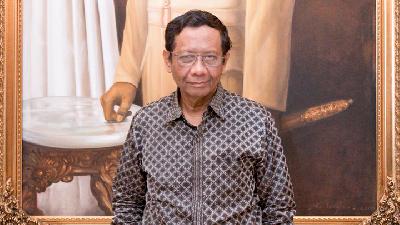
LAST Wednesday, October 23, was a long day for Mohammad Mahfud Md. He was at the Presidential Palace bright and early to be sworn in as the coordinating minister for political, legal and security affairs.

WITH regards to the letter from Mr. Dicky as published in the Letters column of Tempo magazine’s August 6-12, 2019 issue, Ministry of Agrarian Affairs and Spatial Planning/National Land Agency (ATR/BPN) would like to convey that:

Religious Affairs Minister Lukman Hakim Saifuddin once again found himself the target of scorn.
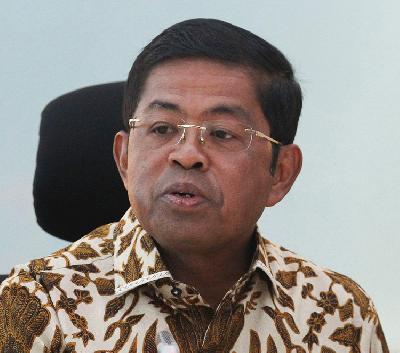
IDRUS Marham made quite a surprise by resigning from his position as Social Affairs Minister, last Friday afternoon, at the Presidential Palace.

The electronic ID card (e-KTP) corruption case is giving Home Affairs Minister Tjahjo Kumolo a big headache. For the past year and a half, some 68 of his subordinates have been questioned by the Corruption Eradication Commission (KPK). "This has clearly affected the mental state of the ministry's personnel," said Tjahjo.

In the past few months, the nation has been besieged by cases linked to religion. They range from blasphemy, which tend to emerge intermittently, to banning the public worship of certain faiths and the celebration of religious holy days, which led to the rejection of Tengku Zulkarnain, deputy secretary-general of the Indonesian Council of Ulama (MUI), when he attempted to arrive at Sintang, West Kalimantan, two weeks ago.
Meanwhile, as the influence of hardline mass groups like the Islam Defenders Front (FPI) grows stronger, moderate Islamic organizations like the Nahdlatul Ulama and Muhammadiyah, seem to be distancing themselves from the government. Understandably, the public wonders whether the religious affairs minister is doing his job.

BOLD initiatives by Marine Affairs and Fisheries Minister Susi Pudjiastuti to combat illegal fishing have sparked protests. Banning the practice of transshipment at sea and putting a stop to licenses for ex-foreign vessels have upset businessmen and fishermen alike. Vice President Jusuf Kalla said that Susi's measures had left the fishing industry in Ambon and Bitung 'gasping for air'. But Susi retorted, "Cold storage facilities in Bitung had long been empty," when Tempo met her on Monday.

Low tax uptake from the fisheries sector has prompted Marine Affairs and Fisheries Minister Susi Pudjiastuti to launch another bold initiative. The action includes a review of vessel weights and an increase in fishery-production tax rates for bigger ships. The move is meant to make fishing firms' contribution to state coffers proportional to their incomes.
As a result of the policy, several companies have lodged protests with the House of Representatives (DPR). Susi, however, remains unfazed. At the ministerial housing complex in Widya Chandra, South Jakarta, last week, Susi said she would not hesitate to crack down on shady business practices and the players behind them.

Until today, it is fair to say that the government has never given any opportunity nor political recognition to fisherwomen. The bill on the protection and empowerment of fishermen, fish farming and salt mining currently drafted by the House of Representatives (DPR) is an opportunity to accomodate such a need. R. Narmoko Prasmadji said he would try to ensure that the bill contain clauses favoring fisherwomen's empowerment. "There should be legal and economic protection for fisherwomen," said Narmoko. Tempo English contributor Pujani Nadine Kamarwan interviewed him at his office in Jakarta two weeks ago. Excerpts:

He Yafei has been a lifelong diplomat with China's Ministry of Foreign Affairs. He served as a deputy foreign minister before being transferred to Geneva in 2010 as ambassador to the United Nations. He is now the deputy director of the overseas Chinese affairs office and has been advocating for China's economic integration initiative: One Belt One Road (OBOR).
The initiative was first unveiled by Chinese President Xi Jinping in 2013. OBOR itself consists of the Silk Road Economic Belt and the 21st Century Maritime Silk Road. It focuses primarily on connectivity and cooperation between Asia and Europe.

For Religious Affairs Minister Lukman Hakim Saifuddin, this year's haj pilgrimage turned out to be an ordeal he had never bargained for: having to deal with two major tragedies in the Holy Land in a matter of weeks. One was the crash of a construction crane over the Haram Mosque and the other was the fatal stampede at Mina, when thousands of pilgrims rushed all at once toward the stone-throwing ritual. More than 100 Indonesians died as a result.
Lukman, a United Development Party (PPP) executive and head of the Indonesian haj pilgrims, along with the Haj Pilgrimage Organizing Committee (PPIH), had to bear responsibility for the two tragic incidents. In particular, he felt he needed to be directly involved in the process of seeking and identifying the Mina tragedy victims. It was a heavy burden to bear, given the constant public pressure for an explanation for the two incidents.

Hasrul Azwar's name repeatedly appears in the charges lodged against Suryadharma Ali, a former minister of religious affairs. The Corruption Eradication Commission (KPK) has also named the United Development Party (PPP) politician a graft co-conspirator, together with Suryadharma. Both are said to have hatched a plot to speed up deliberations on the 2011 haj costs (BPIH). In return, the House of Representatives' (DPR) Commission VIII, which oversees matters related to the pilgrimage, would receive a kickback from the pilgrims' accommodation project. Hasrul talked about accusations of his involvement in the case with Tempo's Sunudyantoro, Jobpie Sugiharto, and Wayan Agus Purnomo at his House office in Senayan, Jakarta, last Friday.

AFTER his preoccupation with the controversy over the Javanese-intonation reading of the Qur'an, Religious Affairs Minister Lukman Hakim Saifuddin now must focus his attention on the Nusantara Islam issue. This involves the debate of a genre of Islam that is unique to Indonesia, one that is being unofficially supported by the government.
The rejection by hard-line Islamists has not dampened the government's plan to keep pushing for a Nusantara (archipelagic) Islam. "They got it wrong. Nusantara Islam is not an ideology," said Lukman, in a special interview with Tempo reporters Sugiharto and Sunudyantoro, last week.

BASYIR Ahmad, the Mayor of Pekalongan in Central Java, had two important meetings last week. On Tuesday, he met with Central Java Governor Ganjar Pranowo. The next morning he flew to Jakarta to meet Minister of Home Affairs Tjahjo Kumolo. To both men he announced his resignation, effective August 9.
He had difficulty denying rumors that the move was to allow his wife, Balqis Diab, now Chairperson of the Golkar Party of Pekalongan, to run for mayor. He even praised his wife for her capability, popularity and financial support three important mayoral requirements. "My wife is an outstanding politician and ready to contest," Basyir said on Tuesday last week.

OWNERS of warung makan (small eateries) are hopeful they can remain open during the month of Ramadhan, because Religious Affairs Minister Lukman Hakim Saifuddin in his Twitter account recently tweeted that such establishments should not be forced to close shop just to honor those who fast. He stated that those who are not obliged to fast must also be respected.
Predictably, his statement caused a public uproar. Some tweeps saluted Lukman's view, but many others disagreed with his view. Equally predictable was the media, which refused to entirely support the stance of the United Development Party (PPP) politician. A mere tweet, Lukman wryly commented, twisted by some people, had led to a counter-productive debate.

Maritime Affairs and Fisheries Minister, Susi Pudjiastuti has earned praise for her resolve in eradicating illegal fishing. However, quite a few business people feel they became victims of her campaign, even though they say they have been law-abiding businesses all this time. They claim the Minister is doing more harm than good, the losses incurred as a result of her campaign reaching up to Rp3 trillion, as she applies the same treatment equally to all concerned parties. At the Tempo office last week, she explained her position, maintaining that everything her ministry implemented was according to existing laws and regulations.
What is the reason for extending the moratorium on foreign fishing vessels to another six months?

As a co-sponsor of the Asia-Africa Conference 60 years ago, Pakistan regards its commemoration last week in Jakarta and Bandung as a very important event. Pakistan Prime Minister Nawaz Sharif had planned to attend, but a call from Saudi Arabia cancelled his plan. He flew to Riyadh instead, to discuss the crisis in Yemen. "He sends his regrets," his advisor on national security and foreign affairs, Sartaj Aziz, head of the Pakistani delegation, told Tempo reporters Maria Hasugian, Natalia Santi and Purwani Diyah. Excerpts:

ONE month after he was appointed coordinating minister for maritime affairs and fisheries, Indroyono Soesilo's working hours have stretched late into the night. Perhaps it's because he is, so far, the only official coordinating minister. "I'm the only who has received his marching orders, the other coordinating ministers are still awaiting theirs," he said when he met the Tempo team two weeks ago.
Indroyono's office, located at the Agency for the Assessment and Application of Technology (BPPT) building in Central Jakarta, is not unfamiliar to him. From 1997 to 1999 he worked there as the BPPT deputy director in charge of natural resources. Today, he occupies the huge office of the former BPPT chairman, Bacharuddin Jusuf Habibie, the last vice president in the New Order era and the first president to launch the reformasi era. "No one dares to occupy this office, they're all afraid," he joked, in explaining how he ended up there.
In the media flurry of profiling President Joko Widodo's new cabinet members, Indroyono appears very subdued and conservative compared to the flamboyant and unconventional Maritime Affairs and Fisheries Minister Susi Pudjiastuti. But there's no question that Indroyono is the man to watch as he is the one tasked with implementing the major changes charted by President Jokowi.

THE newly appointed minister for maritime affairs and fisheries appeared in casual clothes, although she wore a long skirt down to her ankles. She admits to dressing more than she ever did before embarking on her new job. "I must now wear clothing that covers the tattoo on my leg," she said, in explaining her sartorial change. Some things don't change however, as she still insists on wearing 10-centimeter high-heeled shoes and wedges.
Susi is indeed a refreshing change in a society which usually demands protocol and correctness from officialdom and the elite. Yet she has inspired others to be true to one's own self and be proud of it. Just before the ceremony to announce President Joko Widodo's new cabinet members, Susi was approached by Rosita Barack, wife of politician Surya Paloh, who told her, "Ibu Susi, you rock. I really like your tattoos and I have some too." In fact, Susi's tattoo is an image of a flaming bird snaking up her leg, something she acquired when she she was 27 years old.

NOT so long ago Home Affairs Minister Gamawan Fauzi was a student busy preparing his dissertation, something he has been doing over the past year. On weekends, he would work on his quantitative researchdisseminating questionnairesand analyzing them, mainly for his doctoral dissertation, titled 'The Impact of Direct Local Elections on Corruption among Local Chief Executives in Indonesia' which he has now completed. "I defended it last month," he said, with a tone of relief.
On Tuesday last week at his office in Central Jakarta, Gamawan met with Tempo and proudly showed off his 400-page opus, a requirement to complete his doctoral degree program from the State Institute of Public Administration. "It's not the thickness that matters, but my passion to keep on studying," he said.

President Susilo Bambang Yudhoyono inaugurated former Indonesian Ambassador to the United States Dino Patti Djalal as the new deputy foreign affairs minister on July 14. Dino replaces Wardana, who has been appointed Indonesian Ambassador to Turkey.
Dino said his priority was to strengthen Indonesian diplomacy and help Foreign Affairs Minister Marty Natalegawa with his upcoming diplomatic agenda, which includes the United Nations Alliance on Civilization and the Bali Democracy Forum. "I will ensure that the international world continues to trust Indonesia at the end of President Susilo's time in office," Dino told Tempo.

The Judicial Commission and Supreme Court are to hold a joint sitting of the Judges Ethics Board over a judge who had an extra-marital affair. This will be the first such case to be heard by the Board.

World renowned composer Claude Debussy is known for his love of gamelan music. Following his introduction to the traditional music ensemble of Java and Bali, some of his works turned impressionistic and nuance-filled, a departure from the more volatile and dynamic music of the romantic period of the time.
Not many know that the gamelan performance he witnessed at the Paris Exposition Universelle in 1889, had a great influence on some of his pieces. The gamelan Debussy was enamored with was not the dominant Javanese ensemble, but the Sundanese gamelan from West Java. Interestingly, the gamelan that so enthralled Debussy more than a century ago can still be viewed in Sumedang today,
In celebration of Debussy's 150th anniversary, the French government organized Debussy concerts across the globe. Tempo recounts the story of this great composer's secret love affair with the old Sundanese gamelan that instilled the rebellious quality of his compositions.

Regional administrations are preparing legal action for a judicial review over BPNs latest move on land affairs.
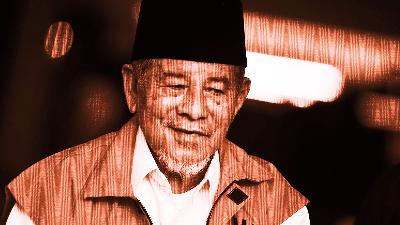
The term “Medan Block” emerged during the trial of former North Maluku Governor, Abdul Gani Kasuba. Medan Block is believed to refer to pre-allocated nickel mining concessions in Halmahera.

Bobby Nasution is suspected of managing the Medan Block nickel mine since 2021. He met with Abdul Gani Kasuba before becoming the Mayor of Medan.

The PDI-P will be nominating Anies Baswedan in the Jakarta gubernatorial election. A popular candidate against Jokowi’s coalition.

The opportunity for Anies Baswedan to contest the Jakarta gubernatorial election is slipping away after the coalition of parties supporting him fell apart. There is a guerrilla from the Palace.

An exclusive Tempo interview with Anies Baswedan regarding his chances to run in the Jakarta regional head election.

Jokowi and Prabowo’s coalition are maneuvering to thwart Anies Baswedan’s candidacy in the Jakarta regional head election. Cabinet posts are being offered as inducements.

Chances for Anies Baswedan to run in the Jakarta regional head election are beginning to open up. A number of political parties support Prabowo Subianto intend to nominate Anies.

Thirteen-year-old Afif Maulana was found dead under a bridge in Padang, West Sumatra. He had allegedly been tortured by the police.

The number of Indonesian umrah minor pilgrimage travelers grows during the fasting month of Ramadan. The nation’s umrah economic potential has not been fully harnessed.

A defendant of the Supreme Court justice bribery case is allegedly subjected to extortion by someone claiming to represent the leadership of the KPK. The name Firli Bahuri is also implicated.
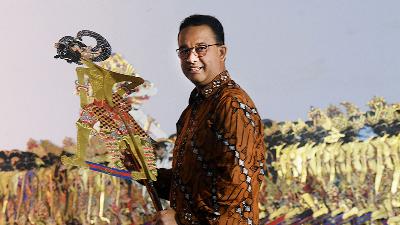
Anies Baswedan talks about the campaign. He admits there are talks with the Ganjar-Mahfud team.

The claim that the Gunung Padang site is the oldest pyramid in the world is strongly challenged. A collaboration of researchers from around the world is needed.

Foreign archeologists doubt the site of Gunung Padang as the world’s oldest pyramid. A journal publisher is going to investigate.

Moh. Wijdan, Head of Ketapang Jaya village, Ketapang, Sampang, East Java, replies to Pressure from the Police and Prosecutors article.

Anies Baswedan is campaigning aggressively through TikTok. It is forbidden to talk about politics and campaigns.

Several high-ranking veterans formerly supporters of Jokowi and Prabowo switched their allegiance to Anies Baswedan. Several officers held disappointment.

Anies Baswedan choses Muhaimin Iskandar to be his vice-presidential running mate. Agus Harimurti Yudhoyono is eliminated in the final turn.

The concept of Kampung Madani is to optimize the business and economic potential of the region. #InfoTempo

A family of Sumatran tigers died after being caught in snare traps in Aceh. With a population of about 600, this endangered wild animal is threatened by poaching, loss of habitat, and conflict with humans.

Poaching produce in the North Natuna Sea is not only triggered by economic need. According to the Director of the Fleet Monitoring and Operations of the Marine and Fisheries Resources Directorate-General in the Maritime Affairs and Fisheries Ministry, Pung Nugroho Saksono, a conflict similar to the Sipadan-Ligitan case between Malaysia and Indonesia should not be allowed to recur.

Corruption Eradication Commission (KPK) investigator, Novel Baswedan, has doubts about his alleged assailant Brig. Rahmat Kadir Mahulette’s statement, calling him a traitor.

MEDAN Mayor Tengku Dzulmi Eldin’s alleged bribery case has roped in a number of parties, from bureaucrats to businessmen.

THE ivory hornbill or rangkong is a symbol of courage and bravery for Dayak community in Kalimantan. The bird is also considered a protector, and acts as the bridge which connects the souls of their ancestors with the Dayaks. Despite this, in the past three years, the population of the ivory rangkong has depleted alarmingly. In 2015, international conservation organizations announced its status as critically endangered.
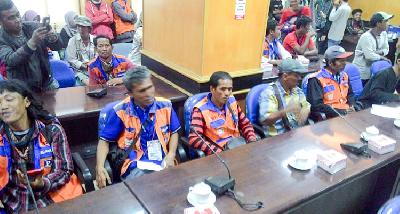
Parking attendants in Makassar were given paralegal training by the Makassar Legal Aid Institute. The program aims to improve legal awareness and embolden participants to fight corruption.

THE Civil Society Coalition has worked with Change.org to launch a petition demanding President Joko Widodo to form a joint fact-finding team (TGPF) to investigate the attack using acid against Corruption Eradication Commission (KPK) investigator Novel Baswedan.

Sartono Kartodiredjo’s dissertation Pemberontakan Petani Banten 1888 (The Peasants’ Revolt of Banten in 1888) and Catatan Harian Imam Samudra (Imam Samudra’s Diaries) were two texts that significantly influenced Jompet Kuswidananto’s work On Paradise, exhibited at the Museum of Contemporary Arts, Grand-Hornu, Belgium.

Organic coffee farming in Kiadan Plaga is the main source of income. It is also a vehicle for the village’s brand of ecotourism.~

Rizieq Syihab, charged in a pornography offense, did not show up at his scheduled questioning at the Jakarta police headquarters on April 25. He said he wanted to travel to Mecca, Saudi Arabia, to perform the lesser pilgrimage (umrah). This Grand Imam of the Islam Defenders Front (FPI) promised he would be present for questioning upon returning from the Holy Land in mid-May. However, the post-Ramadan fasting month holiday has passed and he has yet to return to Indonesia.

Anies Baswedan took advantage of the final week of the campaign to emphasize his rejection of land reclamation work on the north shore of Jakarta. On Wednesday last week, Anies, who is running for the office of the Jakarta governor, endorsed by the Gerindra Party and Justice and Prosperity Party (PKS) went to the dock in Cilincing, North Jakarta. He took part in the parade with the theme "Fishermen Reject Land Reclamation."
There were 150 ships there, each carrying 10 fishermen, which sailed in a convoy on Jakarta Bay, from Kalibaru dock to Cilincing. These fishing boats visited Island G, an island where work had once stopped, which is being worked on by the Agung Podomoro Land company. They put up a banner there which read "Reject Land Reclamation."

Friday last week was a busy day for 47-year-old Anies Baswedan, who began his day's activities from early morning. His schedule was full and it did not end until nearly midnight. "I haven't slept much," said Anies.
That day, Anies, the former education and culture minister, was selected a candidate in the Jakarta gubernatorial election, by the Gerindra Party and the Justice and Prosperity Party (PKS). His running mate is Sandiaga Uno, a Gerindra member and businessman. There was a series of events he had to attend following his nomination: the public declaration of his candidacy, registration at the Jakarta General Elections Commission (KPUD) and political meetings. At the end of that Friday, Tempo reporter Prihandoko had a chance to interview Anies about his nomination

THE four big mammals that have always been the focus of World Wildlife Fund (WWF) Indonesia, according to Arnold Sitompul, are tigers, orangutans, elephants and rhinoceroses. It is not just because they are endemic to the islands of Sumatra, Java and Kalimantan. The animals are listed by the International Union for Conservation of Nature (IUCN) as critically endangered. "These species have always been our main concern because they are endemic to Indonesia, and so they've always been our priority," Arnold told Tempo.
Out of the four endangered mammals, the most threatened are the Sumatran rhinos (Dicerorhinus sumatrensis), of which only about 300 are left in the wild. Meanwhile, the population of Sumatran elephants (Elephas maximus sumatranus) plummeted by 50 percent in less than 10 years. Arnold recently spoke to Tempo English reporter Amanda Siddharta on WWF Indonesia's efforts to conserve these iconic beasts. Excerpts:

The huge education budget20 percent of the total state budgetdemands a significant improvement in the quality of the national education system, something that Indonesians have been yearning for years. Now, it is up to Education and Culture Minister Anies Baswedan to respond to those demands.
The first step that Anies has started is publicizing all data on public education. The Education Balance Sheet publication contains information that until recently was not available to the public, such as the number of students in schools, the proportion of students to teachers, the number of damaged and broken-down schools, the quality of teachers based on teacher competence evaluations, the different education budgets between national and regional budgets, the budget allocation per student and the number of accredited schools.

This is the story of death. It is begun with somebody's death and ends with your own death. Yes, your death. No need for surprises," Faisal Oddang opens his story in his maiden novel Puya ke Puya. Death is the frame of the whole narrative, binding the subplots throughout the 218-page novel.
Yet, death here is not described in fear or anxiety. Faisal sets it with the background of the Toraja community that views death as something intimate. "Most Torajans celebrate death and keep it as close as possible in their memories," writes Faisal.

It is increasingly clear that the charges against Corruption Eradication Commission (KPK) investigator Novel Baswedan were mostly fabricated. The National Ombudsman found suspected fraud in the police investigation. The prosecution's case against Novel, concluded the Ombudsman, should not even have qualified for a court hearing.
Irregularities were first suspected when a 2004 resolved case involving Novel was regurgitated. He was, at the time, posted in a Bengkulu district police precinct and charged with allegedly allowing his subordinates to torture some bird-nest thieves. The case should have been closed after Novel was given a strong warning that same year. Unfortunately, the police dug it up when Novel, as a KPK investigator, exposed the corruption inside the National Police traffic division.

After the noon prayers, Irzal Rakhmadani, 24, packed his things in a rucksack and went out. Two items he never goes without are his stethoscope and sphygmometer. He would ride on his motorbike to the office of the World Wild Fund for Nature (WWF) in Palangkaraya, Central Kalimantan, three kilometers away. There, he would treat people suffering from the effects of forest fire smoke around Palangkaraya. In 2015, he treated some 1,000 patients.
In mid-September, Irzal and his colleagues visited a camp for workers who had been laid off by an oil palm company. Fifteen volunteers of Earth Hour Palangkaraya had gathered to help the smoke victims there. Irzal saw something that distressed him. About 300 people were crammed into a 5x15 meter barrack. Because there was not enough room, tarpaulin tents had been set up outside the barracks. People lived alongside chicken and their pet dogs.

ON the first day that Anies Baswedan began his job as minister for culture and elementary and secondary education a year ago, he knew there would be piles of work ahead of him. Among the many issues that needed to be sorted out was the scarcity of teachers in Indonesia's remote areas. Yet, statistically, there should have been enough teachers to go around. The student-teacher ratio is around 16 to 1. "That's an excess, while in South Korea, the ratio is 30 to 1. Ideally it should be 25 to 1," said Anies, admitting that the problem in Indonesia was one of unequal distribution. In some places such as Papua, the ratio dropped significantly to 75 students for every teacher. So, in May this year, the education ministry initiated the Guru Garis Depan (Frontline Teachers ) program to address the shortage of teachers in the outer parts of the country. So far, 798 teachers have been sent out to teach at 28 regencies. Next year, the number is expected to increase to 3,500. Anies discussed the Frontline Teachers initiative with Tempo English reporters Sadika Hamid, Syari Fani and Amanda Siddharta. Excerpts:

THE Energy and Mineral Resources Ministry has an ambitious plan for next year: raising the budget for the development of renewable energy by 10 times. "The future of Indonesia's development depends on seeking and building renewable energy. We can no longer rely solely on fossil fuel energy, which is bound to become scarce," said Dadan Kusdiana, director of the ministry's section on bio-energy.

A strain of wheat developed by researchers at the Andalas University School of Agriculture in Padang, West Sumatra-the Galur SO-3, or GURI 6 UNAND-has been identified as one of four superior varieties of wheat by the Cereal Plant Research Center last November.

Rice, rendang beef stew, jackfruit curry and many kinds of sambal (chili paste) sit in the front lanjar (guestroom) of Etek Nuraini's traditional rumah gadang house in Nagari Sumpur, in the Tanah Datar regency of West Sumatra. It is early in the month of February. Some 40 guests have gathered, including village elders and West Sumatra Governor Irwan Prayitno. Guests sit on the floor, eating side-by-side. Prayers are recited for the safety and wellbeing of those who will inhabit the house. Family photos hang on the wall. Windows are left open to let sunlight in.
From the vantage of the dining area, the house's spacious interior is in clear view. Six jua (Cassia siamea) pillars grace the building's 17-meter-long sides. Jua, a type of ulin ironwood, is extremely durable: once dry, its impossible to cut it down to size. The walls, meanwhile, are made of surian (Toona ciliata), and floors from bayur (pterospermum javanicum) tree trunks.

Forty young men strain and groan, taut muscles shining with sweat as they haul a jua tree (Cassia siamea) out from a ravine near Singkarak Lake, West Sumatra. The trunk is 11 meters long and will be used as the main pillar in a rumah gadang (traditional Minangkabau house). The house is being built for the heirs of Etek Siti Fatimah in the hamlet of Nagari, Sumpur village, Tanah Datar regency. Etek is what locals call an aunt, or a respected female figure.
The men take turns pulling the tree up and out of the gully. Shortly after noon, they reach the top. After clearing another small rise they toss the trunk down the other side, watching it tumble downhill.

PHOTOGRAPHS of elementary school students hang on the walls of the Ki Hajar Dewantara Building of the Elementary and Secondary Education and Culture Ministry in Jakarta. Most of them show children in remote areas, wearing shabby uniforms but genuine smiles on their faces. The photographs were put up at the request of the new minister, Anies Baswedan, who asked that they be hung everywhere, including in all meeting rooms. "So that when we meet, their faces will remind us that we work for them," said Anies, in his office last week.
Barely two months into his new assignment, Anies has created a buzz in Indonesia's education sector. He changed the function of national school examinations from determining a student's passing grade to merely a tool to measure the quality of education. A recent bombshell was when Anies halted the Curriculum 2013 and reverted to the Curriculum 2006 on December 6. He rejected the new curriculum because he noticed that teachers and schools were not ready to use it. "It's like being told to suddenly switch to an iPhone when you're used to using BlackBerry," Anies explained.

His name is Sekarpandan. He is short, with a huge behind. In Cirebon style wayang kulit, he is one of the nine clown-retainers who accompany the five Pandawa.
Sekarpandan got his bodily form after taunting Semar, who wanted to marry Sekarpandan's older sister Sudiragen. In the fight that ensued, Sekarpandan lost and was thrown into a clump of pandanus, immediately changing form: he became a replica of the person he had been taunting. Also in character.

PERHAPS he was born with a gun in his hand. At the age of 13, Benny Moerdani fought as a member of the military academy cadets. He nearly died when Dutch gunfire destroyed his rifle barrel. Fragments flew into his face, causing him to bleed profusely.
Without being trained as a paratrooper, Benny once jumped from an airplane over Pekanbaru to win back the Caltex oilfield which had been taken over by rebels from the Revolutionary Government of the Republic of Indonesia (PRRI). During a different assault in Padang, his parachute failed to open. The cord wrapped around his leg, and his body slammed against the plane's fuselage. Fortunately he was able to use his reserve chute. With his leg in a cast, he insisted on going to the battlefield.

A national research team has discovered ancient buildings and artifacts at the Mount Padang archaeological site in, Cianjur regency, West Java. The team's deputy chairman for geology, Danny Hilman Natawidjadja, said they had found a 22-centimeter-long stone rod on the mountain's southern slope, about two or three meters below the surface. The rod has pores and magnetic characteristics that attract it to metal. "It resembles Harry Potter's magic wand, which is fit for gripping," Danny said last week.
Other finds included knife-shaped metals, metal waste and burned soil with stacks of stones beneath. Based on laboratory tests, the burned residual materials have been in the location since 5,200 BC.

FOR almost a year, Hamdan Zoelva has only managed to sleep five hours a day. As the chief justice of the Constitutional Court he has had to bear the consequences of his predecessor Akil Mochtar's actions. Last year Akil was arrested, tried and sentenced to jail by the Corruption Eradication Commission (KPK). "Many people don't trust the Court anymore," said 52-year-old Hamdan.
Akil was guilty of accepting bribes from regional chief executives whose elections were in dispute. He was arrested in early October 2013, in the process of receiving money from Hambit Bintih, district chief of Gunung Emas. The case shook the Court. When Hamdan took over, public trust in the judiciary was at its lowest.

CONSTITUTIONAL Court Chief Justice Hamdan Zoelva turned red and his voice rose one decibel higher as he presided over the lawsuit submitted by the Jambi-based National Democrat Party. Two of the three witnesses had given conflicting information. When they were questioned further, they had no valid data. "It was very clear they were making it all up," Hamdan told Tempo.
The inaccurate testimony, according to Hamdan, was one among many problems in the court proceedings looking into disputes arising out of the recent legislative election. Some 700 cases submitted by political parties and legislative candidates were pending, with only three weeks to go before the deadline on June 30. "This week we will evaluate the cases so that a week before the deadline, all is in place."

The government has appointed PGN and Bakrie to complete the Kepodang-Tambak Lorok gas pipeline project. PLN has missed out on Rp3 trillion in savings.

On the eastern part of Sumba Island, Mbatakapidu village chief Jacob Tanda is synonymous with bountiful harvests. He succeeded in turning around a perennial food shortage into abundance and resilience, thanks to his innovative farming ways. He urged his villagers to plant 10 kinds of crops and to re-use the traditional barns to store food. He persuaded women active in the local Community Welfare Program (PKK), to carry out a 'love your local products' campaign. In just four years, he altered an impoverished village into a bountiful, resilient community. Tempo reporter Syari Fani flew to eastern Sumba to report on this success story on the occasion of World Food Day on October 16.

A cross-disciplinary team of scientists is studying a controversial archeological site: Mount Padang. Is it true the site is 10 times larger than Borobudur?

This is a portrait of how things have changed in the first elite neighborhood in the Dutch Indies. The area in question was formerly called Nieuw-Gondangdia. Later its name was changed to Menteng. This is where the wealthy lived, from top government officials and governors to ambassadors and businesspeople. Over the years, however, its beauty has faded. It has grown in an irregular fashion, due to the inconsistent application of city regulations, as well as its residents' lack of concern for the environment.
On this year's anniversary of the city of Jakarta, which coincides with Menteng's 100th anniversary, Tempo attempts to write extensively about Indonesia's first modern tropical residential area. This is where the Indische (Indies) architectural style originated. Not many buildings of this style exist today. Now it is a crowded, polluted area, used by motorists avoiding carpool roads. Menteng is a typical example of Jakarta's muddled zoning regulations.

In the village of Lendang Nangka, East Lombok, residents have attained self-sufficiency in their clean water supply. In addition to receiving an award for their efforts, the villages water supply has made it easier for residents to conduct their business.

The month of Ramadan (fasting) will end with the Idul Fitri holidays, a cause for joyous celebration. Young and old, the high and the low, will come together in a new beginning, marked by day-long feasting and fun. But there will also be a sobering moment of spiritual reconnection, of forgiveness and joint prayers, giving thanks to the greatness of God Almighty. At this joyous time, Tempo English Edition presents a special photo essay of Ramadan celebration in eastern Indonesia.

Artists from Indonesia used various actions to capture the attention of audiences in Berlin. Sundanese language was not an obstacle when it appeared as a performance.

Located in the middle of the World Coral Triangle, Indonesia plays an important role in determining the fate of the tuna, the highly popular food fish that is slowly but irrevocably diminishing from the earth’s oceans, no thanks to years of excessive fishing. Processing plants can no longer meet fish production capacity, fishermen must sail farther out to sea for their catches yet exports are declining. Can government regulations bring back the endangered tuna? A special report by the Tempo English Edition team.

The winner of the Rancage Literary Award was announced. Ajip Rosidi has begun to pass on the judging of Sundanese literature to his colleagues.

The Special 88 Detachment has been deployed in pursuit of the Medan Bank CIMB robbers. They are suspected of having links to former GAM members and other groups.

The high bovine mortality rate drove researchers at Nusa Cendana University to create a supplement that fattens cows and makes them resistant to disease.

How will corruption eradication fare in 2009? The optimistic will reply: “full of challenges”, while the pessimists are bound to say: “dismal”. We prefer the word “endangered”.

Lombok’s Sasak Muslims enjoy unique traditions during Ramadan.

Tan Deseng is recognized as a skilled Sundanese ethnomusicologist. He set up a workshop with ethnic-Chinese students who love Sundanese culture.

The Cendana Axis
The Ups and Downs of the Cendana Family
After Suharto stepped down, the range of business activities as well as the wealth of the Cendana family seemed to decline. But the sons and daughters of the former president still hold key positions in a number of corporations.

The Medan District Court has rejected Adelin Lis’s defense. Forestry Minister Kaban will be presented as a witness.

Researchers find pandanus (screw pine) with potential similar to buah merah on the Island of Yapen, Papua.

The grandson of former President Suharto, Danny Indra Rukmana, married celebrity Lulu Tobing. A lavish wedding was held.

THE life rhythm of this youth suddenly changed in mid-July. He is now spotlighted, photographed, interviewed and gets to meet all kinds of people. Jonathan Pradana Mailoa is receiving praises galore because he is the shining star in a nation that is going through so much darkness: earthquakes, floods, famine and that endless disease called corruption. Indonesias reputation went up a notch through the brilliance of this 16-year-old, when he became the absolute winner of the 37th International Physics Olympics, held in Singapore and participated in by 86 countries.

The World Cup ended last Sunday, but people are still talking about soccer. Not Italys victory over France, but the duel between Zinedine Zidane, the captain of the French team, and Marco Materazzi, the Italian back.

LAST month, the Philippine government began identification of Indonesian migrants in Mindanao. They were offered a choice of repatriation to Indonesia, legalization or naturalization. Legalization allows the immigrants to stay in the Philippines and retain their Indonesian citizenship while naturalization provides the migrants with full Filipino citizenship. Most of the migrants came from the islands of Sangihe and Talaud in northern Sulawesi. The forefathers of these Indonesians, who have since taken Philippine citizenship, arrived in the southern Philippines in the 15th century. Locally called the Sangil, they considered themselves natives of Mindanao Island, although they spoke a language originating in Sangihe. Tempo correspondent Verrianto Madjowa traveled to Mindanao last September to observe the lives of the Indonesian migrants and filed this report.

Last week, Siti Hardijanti Rukmana was nominated PKPBs candidate for the 2004 presidential election. What is the extent of preparations by the Cendana family?

Like Malin Kundangthe folklore character who disowns his own motherYLBHI once fought the Jakarta City administration, which played a key role in establishing YLBHI and funding its first years of operation.

Even before the verdict handed down in The Hague last Tuesday, Malaysia had long been occupying Sipadan and Ligitan. TEMPO journalist Wenseslaus Manggut, who recently traveled to the islands, was unceremoniously told to leave in no uncertain terms by the Malaysian Police.

While a fugitive, Tommy Suharto often came to the family compound on Jalan Cendana. A long-time employee now tells TEMPO how he eluded capture.

The High Court is investigating six Medan District Court judges on charges of accepting bribes. However, they have only been suspended from duty pending further inquiry.

Semen Padang has rejected the governments wish to replace the companys board of directors. The reason for this was that financial performance was improving. Whats going on?

Expanding Padang restaurants apply a variety of business models to produce a remarkably consistent cuisine.

The planned sale of Semen Gresik-Padang-Tonasa has become extremely complicated since the West Sumatra DPRD and local government took over Semen Padang.

Surprise! I Putu Gde Ary Suta has been appointed chairman of IBRA. Can he win public confidence, bearing in mind he used to be close to the Cendana family?

This is the testimony of those involved in a 1998 bomb scare in Medan. They say they were obeying orders from an intelligence officer.

Omar Dani's Plea offers up a new fact regarding Bung Karno's presence at the Halim Perdana Kusuma air base. It's another piece of information from an actor with a role in history, muzzled for 30 years.

Two journalists investigate the Mindanao rebellion. What was the role of President Abdurrahman Wahid in negotiations between the Philippine government and the Salamat Hashim group? Why were they inspired by the liberation of Timor Leste?

For the second time this year, and against his doctor's advice, senior economist Gustav F. Papanek from Boston University returned to Indonesia. With a new government in place, this 87-year-old former advisor to the 'Berkeley Mafia'influential economists of the New Order erafelt the need to address a very urgent problem: The declining income of the poor, which as he noted "is immoral and also politically undesirable; therefore, it is important to take substantial steps to increase their income. The only way you can do that is by providing industrial jobs."
Although he was unable to meet President Joko Widodo, he managed to meet Sofyan Djalil, Economic Coordinating Minister; General Moeldoko, Armed Forces Chief; and ChatibBasri, former Finance Minister, and gave talks in three universities and Bank Mandiri as well as numerous interviews with the media. In a packed schedule, averaging two presentations a day, he found ways to push his ideas.

Irregularities abound in the distribution of 'Rice for the Poor' program.
Independent journalism needs public support. By subscribing to Tempo, you will contribute to our ongoing efforts to produce accurate, in-depth and reliable information. We believe that you and everyone else can make all the right decisions if you receive correct and complete information. For this reason, since its establishment on March 6, 1971, Tempo has been and will always be committed to hard-hitting investigative journalism. For the public and the Republic.